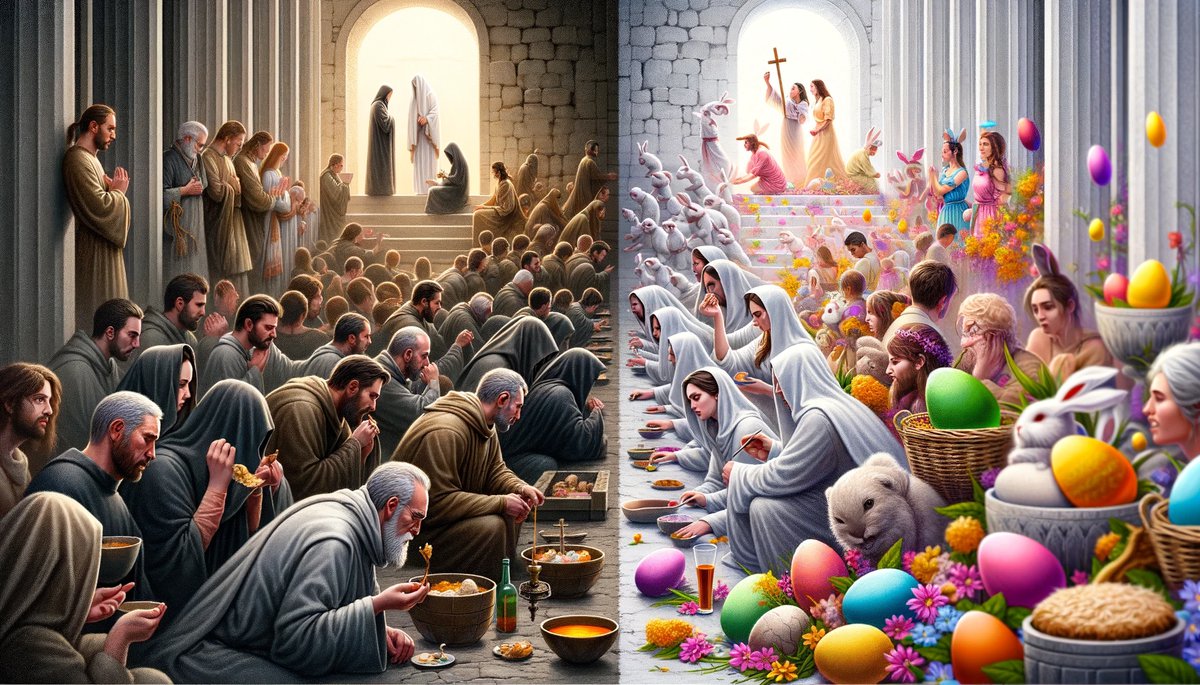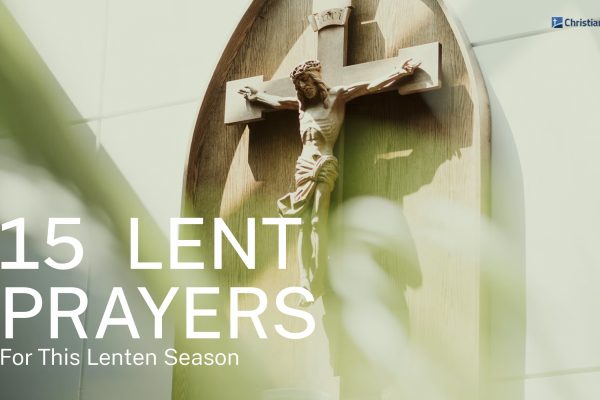Home>Special Themes>What Is The Christian Lent Season?


Special Themes
What Is The Christian Lent Season?
Published: February 27, 2024
Ericka Andersen, an editor at Christian.net, expertly merges digital strategy with content creation, focusing on faith and societal issues. Her communication skills enhance the platform's engaging narratives, fostering meaningful dialogue on belief's impact on society.
Discover the significance and traditions of the Christian Lent season, including fasting, prayer, and reflection, in this special-themed exploration.
(Many of the links in this article redirect to a specific reviewed product. Your purchase of these products through affiliate links helps to generate commission for Christian.net, at no extra cost. Learn more)
Table of Contents
The Origins of Lent
-
Early Christian Practices: The origins of Lent can be traced back to the early Christian church, where it was initially observed as a period of preparation for new converts before their baptism. This period of preparation often involved fasting and self-examination as a way to spiritually prepare for the celebration of Easter.
-
Historical Development: Over time, the observance of Lent evolved and became more structured within the Christian tradition. By the 4th century, Lent had developed into a 40-day period of fasting and reflection, mirroring the 40 days that Jesus spent fasting in the wilderness.
-
Biblical Influence: The duration of Lent is directly linked to the 40 days that Jesus spent in the wilderness, as described in the Gospels of Matthew, Mark, and Luke. This period of fasting and temptation is seen as a time of spiritual testing and preparation for Jesus' public ministry.
-
Global Adoption: The observance of Lent spread throughout the Christian world, with different regions adopting their own customs and traditions. Today, Lent is observed by various Christian denominations, including Catholics, Orthodox Christians, and many Protestant churches, each with its own unique practices and observances.
-
Symbolism of 40 Days: The 40-day duration of Lent holds symbolic significance, representing the time Jesus spent in the wilderness and also reflecting the 40 days of the Great Flood in the Old Testament, as well as the 40 years that the Israelites wandered in the desert. This period is often seen as a time of spiritual renewal, repentance, and preparation for the celebration of Easter.
-
Spiritual Preparation: Lent is a time for Christians to reflect on their faith, engage in acts of self-discipline, and draw closer to God through prayer, fasting, and almsgiving. It serves as a period of spiritual preparation, leading up to the joyous celebration of Easter, the central event in the Christian calendar.
Read more: What Is Lent Season?
The Significance of Ash Wednesday
-
Commencement of Lent: Ash Wednesday marks the beginning of the Lenten season, a period of 40 days (excluding Sundays) leading up to Easter. It holds immense significance in the Christian calendar as it symbolizes the start of a time for reflection, repentance, and spiritual renewal.
-
Ashes as a Symbol: The most distinctive feature of Ash Wednesday is the imposition of ashes on the foreheads of the faithful. The ashes, typically made from the burned palm branches blessed on the previous year's Palm Sunday, serve as a powerful symbol of mortality and penance. As the priest applies the ashes in the shape of a cross, they recite the words, "Remember that you are dust, and to dust you shall return," echoing the biblical account of humanity's origins from dust.
-
Memento Mori: The act of receiving ashes on Ash Wednesday serves as a poignant reminder of human mortality and the transient nature of life. It prompts believers to contemplate their own mortality, encouraging a deeper appreciation for the gift of life and a recognition of the need for spiritual growth and reconciliation.
-
Repentance and Humility: The ashes also symbolize repentance and humility. By wearing the ashes, Christians publicly acknowledge their need for forgiveness and their commitment to turning away from sin. It is a visible sign of inner contrition and a willingness to seek reconciliation with God and others.
-
Preparation for Easter: Ash Wednesday sets the tone for the Lenten journey, inviting believers to engage in acts of prayer, fasting, and almsgiving. It provides an opportunity for introspection, self-examination, and a recommitment to living a life in accordance with Christian values. The 40-day period of Lent, initiated by Ash Wednesday, culminates in the celebration of the resurrection of Jesus Christ on Easter Sunday.
-
Community and Solidarity: The observance of Ash Wednesday fosters a sense of communal solidarity among Christians. As individuals come together to receive the ashes, it serves as a visible sign of their shared faith and commitment to the Lenten season. The act of receiving ashes also serves as a public declaration of one's faith, creating a sense of unity within the Christian community.
-
Spiritual Preparation: Ash Wednesday serves as a call to spiritual renewal and a reorientation towards God. It invites believers to embark on a journey of self-examination, prayer, and repentance, preparing their hearts and minds for the profound significance of Easter. The solemnity of Ash Wednesday sets the stage for a period of introspection and spiritual growth, ultimately leading to the celebration of the resurrection of Christ.
In summary, Ash Wednesday holds deep significance in the Christian faith, serving as a solemn reminder of human mortality, a call to repentance and humility, and the commencement of a period of spiritual preparation leading up to the joyous celebration of Easter.
Practices and Traditions During Lent
-
Fasting: One of the central practices during Lent is fasting, which involves abstaining from certain foods or meals as a form of self-discipline and spiritual reflection. Many Christians choose to fast on Ash Wednesday and Good Friday, consuming only one full meal and abstaining from meat on those days. Some may also fast from particular indulgences or habits throughout the entire Lenten period, using this time to focus on prayer and self-denial.
-
Prayer: Lent is a time for intensified prayer and spiritual devotion. Many churches offer special prayer services and devotional gatherings during this season, providing opportunities for believers to deepen their prayer life and seek a closer relationship with God. Additionally, individuals may engage in personal prayer practices, such as daily meditation, the recitation of specific prayers, or the reading of spiritual texts.
-
Almsgiving: The act of giving to those in need, known as almsgiving, is another significant tradition during Lent. This practice is rooted in the belief that acts of charity and generosity reflect the love and compassion of God. Christians are encouraged to support charitable causes, volunteer their time, and contribute to the well-being of others as a tangible expression of their faith during the Lenten season.
-
Liturgy and Worship: Throughout Lent, churches often incorporate special liturgical elements into their worship services. This may include the use of specific readings, hymns, and rituals that reflect the themes of repentance, sacrifice, and redemption. The liturgical color for Lent is typically purple, symbolizing penitence and preparation.
-
Stations of the Cross: Many Christian communities observe the Stations of the Cross, a devotional practice that commemorates the events leading up to Jesus' crucifixion. This tradition involves meditating on 14 different stations, each representing a specific moment in Jesus' journey to Calvary. It serves as a powerful way to reflect on the suffering and sacrifice of Christ and is often accompanied by prayers and reflections.
-
Abstinence: In addition to fasting, some Christians choose to practice abstinence during Lent, refraining from certain activities or luxuries as a means of spiritual discipline. This may include abstaining from entertainment, limiting screen time, or giving up specific habits that detract from one's spiritual focus.
-
Lenten Devotions: Many individuals and families engage in specific devotional practices during Lent, such as reading through the Gospels, participating in daily reflections, or following a Lenten devotional guide. These devotions are designed to foster a deeper spiritual connection and a heightened awareness of the significance of the Lenten season.
-
Renewal of Baptismal Vows: In some Christian traditions, Lent provides an opportunity for the renewal of baptismal vows. This symbolic act reaffirms one's commitment to the Christian faith and serves as a reminder of the spiritual rebirth and renewal that is central to the Easter celebration.
Overall, the practices and traditions observed during Lent are intended to facilitate a period of spiritual growth, self-examination, and preparation for the celebration of Easter. Each tradition serves as a means of deepening one's faith, fostering a sense of community, and embracing the transformative power of the Lenten season.
The Meaning of Lenten Fasting and Abstinence
-
Spiritual Discipline: Lenten fasting and abstinence are rooted in the practice of spiritual discipline. By voluntarily refraining from certain foods or activities, individuals seek to cultivate self-control, moderation, and a heightened awareness of their spiritual needs. This intentional self-denial is a way to focus on the deeper spiritual significance of the Lenten season and to align one's desires with the values of faith and devotion.
-
Symbol of Sacrifice: Fasting and abstinence serve as a symbolic reminder of the sacrifice of Jesus Christ. By choosing to forgo certain comforts or pleasures, believers enter into a tangible experience of sacrifice, mirroring the ultimate sacrifice made by Christ on the cross. This symbolic act of self-denial fosters a deeper appreciation for the redemptive work of Christ and the significance of His sacrifice in the Christian faith.
-
Renunciation of Worldly Attachments: Lenten fasting and abstinence provide an opportunity for individuals to detach from worldly distractions and material comforts. By intentionally limiting consumption and indulgence, believers create space for spiritual reflection and a reorientation towards the values of simplicity, humility, and dependence on God. This intentional renunciation of worldly attachments allows for a deeper focus on spiritual growth and a reevaluation of priorities.
-
Physical and Spiritual Purification: The act of fasting and abstaining is often associated with purification, both physically and spiritually. By refraining from certain foods or habits, individuals engage in a process of cleansing and renewal, allowing for a heightened sense of spiritual clarity and attentiveness. This purification process is seen as a means of preparing the body and soul for a deeper engagement with the spiritual practices of prayer, meditation, and self-examination during the Lenten season.
-
Solidarity with the Suffering of Christ: Lenten fasting and abstinence also serve as a way for believers to enter into solidarity with the suffering of Christ. By willingly embracing a period of self-denial and sacrifice, individuals align themselves with the journey of Christ to the cross, acknowledging the challenges and trials that He endured. This act of solidarity fosters a deeper empathy for the suffering of Christ and a renewed commitment to following His example of selflessness and obedience.
-
Preparation for Easter Joy: While Lenten fasting and abstinence involve a period of self-discipline and restraint, they ultimately lead to the celebration of Easter joy. By engaging in these practices, believers prepare their hearts and minds to fully embrace the joy and significance of the resurrection of Christ. The intentional self-denial of Lent serves as a prelude to the jubilant celebration of Easter, allowing for a profound appreciation of the redemptive work of Christ and the promise of new life.
In summary, Lenten fasting and abstinence hold deep spiritual significance, serving as a means of spiritual discipline, a symbol of sacrifice, a renunciation of worldly attachments, a process of purification, an expression of solidarity with Christ, and a preparation for the joy of Easter. These practices are integral to the Lenten journey, fostering a deeper spiritual awareness and a transformative experience of faith.
The Importance of Lent in the Christian Calendar
-
Spiritual Preparation: Lent holds immense importance in the Christian calendar as it serves as a dedicated period for spiritual preparation and renewal. It offers believers an opportunity to engage in self-reflection, repentance, and a deepening of their faith as they prepare to commemorate the central event of the Christian faith – the resurrection of Jesus Christ.
-
Connection to Easter: Lent is intricately connected to the celebration of Easter, the most significant event in the Christian calendar. The 40-day period of Lent mirrors the 40 days that Jesus spent in the wilderness, and it culminates in the joyous celebration of His resurrection. As such, Lent provides a focused and intentional season for believers to prepare their hearts and minds to fully embrace the profound significance of Easter.
-
Renewal of Faith: The observance of Lent offers a time for the renewal of faith and a recommitment to living a life in accordance with Christian values. Through practices such as fasting, prayer, and almsgiving, believers are encouraged to deepen their spiritual connection, seek reconciliation, and grow in their relationship with God and others.
-
Historical and Biblical Roots: Lent's historical and biblical roots underscore its significance in the Christian calendar. The observance of Lent has been a longstanding tradition within the Christian faith, dating back to the early centuries of the church. Its connection to the biblical narrative, particularly the 40 days that Jesus spent in the wilderness, reinforces its importance as a period of spiritual testing and preparation.
-
Community Engagement: Lent fosters a sense of communal engagement and solidarity within the Christian community. As believers come together to observe the Lenten season, they share in a collective journey of spiritual growth, mutual support, and a shared commitment to living out their faith. This communal aspect reinforces the significance of Lent as a unifying and transformative period within the Christian calendar.
-
Emphasis on Sacrifice and Redemption: Lent emphasizes the themes of sacrifice and redemption, central to the Christian faith. Through practices such as fasting and abstinence, believers are invited to reflect on the sacrificial love of Christ and the redemptive power of His resurrection. This emphasis on sacrifice and redemption underscores the profound theological significance of Lent within the Christian calendar.
-
Preparation for Baptism and Confirmation: For many Christian traditions, Lent is a time of preparation for individuals who are seeking baptism or confirmation within the church. It provides a period of instruction, spiritual formation, and discernment as candidates prepare to publicly profess their faith and commitment to the Christian journey.
-
Cyclical Rhythm of the Liturgical Year: Lent contributes to the cyclical rhythm of the liturgical year, offering a structured and intentional season within the broader framework of Christian worship. Its placement within the liturgical calendar provides a deliberate opportunity for believers to engage in a period of spiritual introspection and growth, complementing other seasons and celebrations within the Christian calendar.
In essence, Lent's importance in the Christian calendar is multifaceted, encompassing spiritual preparation, a connection to Easter, the renewal of faith, historical and biblical roots, community engagement, emphasis on sacrifice and redemption, preparation for baptism and confirmation, and its role within the cyclical rhythm of the liturgical year. This collective significance underscores the integral role of Lent in shaping the spiritual journey of believers and the broader narrative of the Christian faith.















